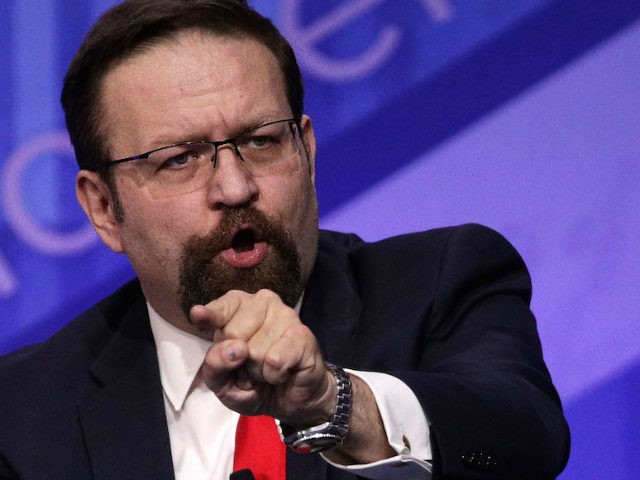Tuesday on CNN’s “OutFront,” while discussing the Trump administration’s warnings that Syria’s government will “pay a very heavy price” if they launch a chemical weapons attack, President Donald Trump’s deputy assistant Sebastian Gorka warned Syria should not “test” the president.
Partial transcript as follows:
BURNETT: How certain are you that the Assad regime is planning another chemical weapon attack?
GORKA: Well, we don’t give away the details of the intelligence operation or the intelligence that we receive, but enough to make that statement last night with adequate certainty that Damascus had to be sent a message.
BURNETT: So the Pentagon is saying — just so everyone understands kind of the lay of the land here —that what’s happening is happening at the same airbase from which Assad launched his April attack of course in which 89 civilians were killed, children among them. People are seeing some of the horrific images right now. The president responded. He struck that base with 59 cruise missiles, as you know, Sebastian. If they are able to store chemical weapons at this base now, did that strike fail?
GORKA: Not at all, because it was more than just a kinetic measure. As the vice president stopped me the day after the attack and asked me, ‘do you think they got the message?’ and I replied, to him, ‘Yes Mr. Vice President, the world got the message.’ People have to look beyond kinetic aspects of the theater that we are engaged in. This is as much about statecraft, and strategic communications and the president was sending a very clear message. Under this administration of Donald J. Trump, red lines mean red lines.
BURNETT: So what makes you think this threat, though, this time around, of a heavy price, as the White House has said, will deter Syria if that stick where you took action in April didn’t? He’s doing it again.
GORKA: What would you do in his position, if the most powerful nation in the world demonstrated to you that we can see what you are doing? Wouldn’t you think again about actually executing on that decision? I know I would. I wouldn’t test Donald J. Trump.
BURNETT: So you think they will pull back because of this threat of a heavy price?
GORKA: I think if we’re talking about rational actors, if we’re talking about an intact command, then yes, the reasonable decision would be to not test the resolve of the president.
BURNETT: So let me ask this—because of the statement, as you refer to, by the White House, warned Assad if he, quote, conducts another mass murder attack using chemical weapons, he and his military will pay a heavy price. What exactly does that mean when you say heavy price?
GORKA: Well, this isn’t the Obama administration, so we don’t give our gameplay away. Whether you are playing poker or you are doing geopolitics, you don’t show your hand in advance. The fact is very clear. We made it clear in the statement—we’re there to crush ISIS. But the use of chemical weapons is a national security threat to the United States, and there will be significant consequences for any state action using WMD. That is all we are prepared to say at this point for reasons of operational security.
BURNETT: So heavy price does suggest action. It sounds a lot like the red line. It’s something, as you point out, President Trump has heavily criticized President Obama for setting a red line and failing to meet it.
GORKA: Repeatedly.
BURNETT: Here is President Trump.
(BEGIN VIDEO CLIP)
TRUMP: The Obama Administration had a great opportunity to solve this crisis a long time ago when he set the red line in the sand. And when he didn’t cross that line after making the threat, I think that set us back a long ways.
(END VIDEO CLIP)
BURNETT: Is President Trump worried about drawing the line of heavy price which is a synonym for the red line, and ending up in the same spot that President Obama did?
GORKA: Not at all because we’re not about rhetoric. We’re about statecraft. We’re about action, whether it’s a MOAB bomb in Afghanistan, whether about 59 cruise missiles against this air base after the prior attack. This isn’t about words. This is about using all the elements of national power to realize our national interests, to stabilize the region and to protect our partners as well. This isn’t just about words, Erin.
BURNETT: When you say statecraft, it sounds like you are saying actual military action.
GORKA: No statecraft is the combination of all the forms of power the nation has, whether it’s intelligence, military, law enforcement, information. We use them together. We’ve had eight years of just talk, talk, talk and facilitating bad guys. That ended on 12:01 on the 20th of January.
BURNETT: Is the president willing to let this escalate? You have one strike. , if you have to strike again this could escalate to a full-on war. Is he willing to do that if that’s what it takes
GORKA: This isn’t about whether or not we are prepared to do something. We sent the message to Damascus. The ball is in their court. Do they wish to be reasonable or do they wish to use one of the most heinous weapons known to man? Because if they do, we will take action. It’s that simple.
Follow Pam Key on Twitter @pamkeyNEN

COMMENTS
Please let us know if you're having issues with commenting.